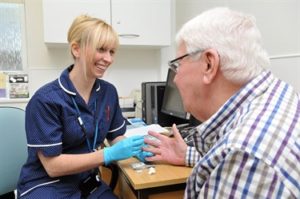Diabetes Nurse: Education and Career Information
Diabetes is a serious condition that can be life-threatening. There is a lot of education and care involved in safely managing this disease. A diabetes nurse is someone who is committed to the nursing profession and has become an advocate for diabetes awareness. They are always working to assist patients with the disease and help to educate patients and their families on how to avoid symptoms and remain in a healthy condition. This is a registered nursing position, which is a lucrative profession.
What does a diabetes nurse do?
A diabetes nurse is a registered nurse, but can advance to become a Certified Diabetes Educator (CDE). They are responsible for standard nursing duties, but also counsel individuals and groups on the basic rules of good nutrition, healthy eating and how to control their blood sugar levels. They work alongside dieticians to make sure patients have the right education on food portion control, what to eat and what will be unhealthy. They provide education to individuals and communities by assisting in the management of diabetes. These nurses also have a specialized knowledge of the endocrine system, including the hypothalamus, thyroid, parathyroid, adrenals, pineal body and the reproductive glands.
Diabetes nurses must possess excellent communication skills in order to relay information between patients, physicians, family members and even insurance companies. They must also be compassionate as they are dealing with a disease that is often chronic and can be life threatening. These nurses also demonstrate how to check blood sugar levels, and closely monitor the patients while they are in the medical facility. They assess nutritional needs, diet restrictions and current health plans to develop and implement additional care plans for proper diet and also provides nutritional counseling. They must communicate with patients on a continuous basis and should be highly organized. You will find these nurses in hospitals, clinics, and other healthcare facilities.
How much does a diabetes nurse earn?
The average salary for a registered nurse is about $68,000. As a certified diabetes educator, the average salary is about the same, with the potential to make up to $85,000 per year. The amount of pay can fluctuate depending on education, experience, location and whether or not the nurse is working private duty.
What types of skills are needed to become a diabetic nurse?
Active Listening: Giving full attention to what other people are saying, taking time to understand the points being made, asking questions as appropriate, and not interrupting at inappropriate times.
Social Perceptiveness: Being aware of others’ reactions and understanding why they react as they do.
Service orientation: Actively looking for ways to help people.
Critical thinking: Using logic and reasoning to identify the strengths and weaknesses of alternative solutions, conclusions or approaches to problems.
Speaking: Talking to others to convey information effectively.
Coordination: Adjusting actions in relation to others’ actions.
Monitoring: Monitoring/Assessing performance of yourself, other individuals, or organizations to make improvements or take corrective action.
Learning Strategies: Selecting and using training/instructional methods and procedures appropriate for the situation when learning or teaching new things.
Complex Problem Solving: Identifying complex problems and reviewing related information to develop and evaluate options and implement solutions.
Persuasion: Persuading others to change their minds or behavior.
Time Management: Properly managing their time as it relates to patient care, and teaching patients how to properly utilize their time to take their blood sugar, etc.
Negotiation: Successfully negotiating information with patients and their families for positive outcomes.
Math: Using math to solve problems.
Science: Knowledge, understanding and use of scientific rules, methods and procedures.
Internship Requirements
Internship requirements vary based on school, state and program. There will be an internship in the undergraduate course of study, and a diabetic nurse must complete an internship program in their master’s program of 500 hours in diabetic medicine.
Education Requirements
In order to pursue a career in nursing, the student must enter into a four-year Bachelor’s of Nursing (BSN) program. They will study coursework like biology, anatomy, mathematics and other sciences. Once they complete this program, they must successfully pass the National Council Licensing Examination for Registered Nurse (NCLEX-RN) to become a nurse.
Once that degree and license has been conferred, the student should enroll into a master’s level nursing program. This will provide additional specialized education for the nurse, and help them to become well-versed in diabetic medicine. Many facilities also require diabetes nurses to become certified as advanced diabetes specialists. In order to take the exam, nurses must possess a master’s level degree and a minimum of 500 hours of professional nursing experience in a diabetes setting. This exam is called the Advanced Diabetes Management Certification and is administered via the American Association of Diabetes Educators and the American Nurses Credentialing Center. Once a nursing professional has become certified, they must complete regular continued education classes in diabetes in order to stay up to date on the latest technology and research in their field.
Although this may seem like quite a bit of work, obtaining the Commission on Dietetic Registration (CDR) certification is also beneficial. In the master’s program, the nurse should not only study diabetic medicine, but should also explore coursework in nutrition. This will open additional doors in this career path that will make the profession more rewarding. This is a highly specialized position that should be taken seriously, as teaching others how to control their diabetic condition can be a matter of life and death. For the right person, understanding this disease can assist with becoming a community counselor and imparting knowledge and education. Once the master’s degree has been obtained, a nurse can also consider teaching a few classes at the undergraduate level. The opportunities are great to work in office settings to develop educational plans for diabetes communication. Getting an advanced degree beyond the master’s will also assist in advancing in the career path.






